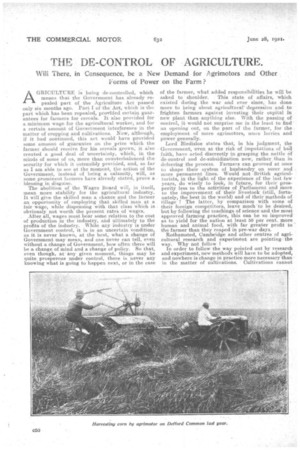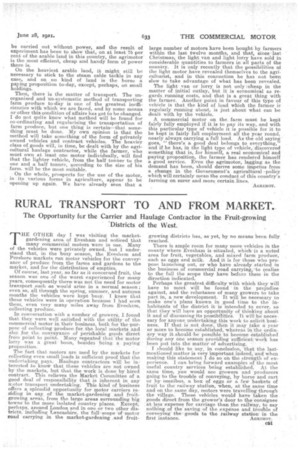THE DE-CONTROL OF AGRICULTURE.
Page 34

Page 35

If you've noticed an error in this article please click here to report it so we can fix it.
Will There, in Consequence, be a New Demand for igrirnotors and Other Forms of Power on the Farm ?
AGRICULTURE is being de-controlled, which means that the Government has already repealed part of the Agriculture Act passed only six months ago. Part I of•the Act, which is the part which has been repealed, provided certain guarantees for farmers for cereals. It also provided for a minimum wage for the agricultural worker, and for a certain amount of Government interference in the matter of cropping and cultivations. Now, although, if it had oontinued, this act would • have provided some amount of guarantee on the price which the farmer Should receive for his cereals grown,' it also created a good deal of uncertainty, which, in the minds of some of us, more than counterbalanced the security for which it ostensibly provided, and, so far as I am able to see at the moment, the action of the Government, instead of being a calamity, will, as some prominent farmers have already stated, prove a blessing in disguise. The abolition of the -Wages Board will, in itself, mean more stability for the agricultural industry. It will give the skilled man a, chance and the faimer an opportunity of employing that skilled man at a fair wage, while dispensing with that class Which is obviously not worth the present rates of wages. After all, wages must bear some relation to the cost of produCtion in the 'industry, and ultimately. to the profits of the industry. While any industry is under Government control, it is in an uncertain condition, as it is never known, at the best, what a change of Government may mean, and one never can tell, even without a change of Government, how often there will be a change of mind and a change of policy. So that, even though, atany given moment, things may be quite prosperous under control, there is never any knowing what is going to happen next, or in the ease
of the farmer, what added responsibilities he will be asked to shoulder. This state of affairs, which existed during the war and ever since, has done more to bring about agricultural depression and to frighten farmers against investing their capital in new plant than anything else. With the passing of control, it would not surprise me in the least to find an opening out, on the part of the farmer, for the . employment, of more agrirnotors, more lorries. and Power generally.
Lord Bledisloe states that, in his judgment, the Government, even at the risk of imputations of bad faith, have acted discreetly in grasping the nettle Of 'de-control and de-subsidization now, rather than in deferring the process. Farmers can proceed at once to shape their system of husbandry on surer and more permanent lines. Would not British agriculturists, in the light of the experience of the last few years, do wisely to look, in future, for their prosperity less to the activities of Parliament and more to the improvement of their livestock (still, fortunately; the best in the world) and of their methods of tillage ? The latter, by comparison with some of their foreign competitors, leave much.to be desired, but by following the teachings of science and the most approved farming practice, this can be so improved as to yield for the nation at least 50 per cent, more human and animal food, with far greater profit to the farmer than they reaped in pre-war days,
Rothamsted, Cambridge and other centres of agricultural research and experiment are pointingthe way. Why not follow ? In order to follow the way pointed out by research and experiment, new Methods will have to :be adopted, and nowhere is change in practice more necessary than' in the matter of cultivations. Cultivations cannot be carried out without power, and the result of experiment has been to show that, on at least 75 per cent of the arable land in this country, the agrimotor is the most efficient, cheap and handy form of power there is.
On the heaviest arable land, it might still be necessary to stick to the steam cable tackle in any case, and on no kind of land is the horse a paying proposition to-day, except, perhaps, on small holdings.
Then, there is the matter of transport. The unorganised and un-systematic method of transporting farm produce to-day is one of the greatest inefficiencies with which we are faced, and by some means or other this condition of affairs has got to be changed. I do not quite know what method will be found for co-ordinating and regularising the transportation of farm produce, but one thing is certain—that something must be done. My own opinion is that the method will take something of the form of privately owned vehicles and contract vehicles. The heavier class of goods will, in time, be dealt. with by the agricultural haulage contractor, while the farmer, who must own at least one motor individually, will find that the lighter vehicle, from the half tonner to the one and a half tonner, according to the size of his farm, will he the most suitable.
On the whole, prospects for the use of the motor, in its various forms in agriculture, appear to be opening up again. We have already seen that a large number of motors have been bought by farmers within the last twelve months, and that, since -last ' Christmas, the light van and light lorry have sold in considerable quantities to farmers in all parts of the country. It is only recently that the possibilities of the light motor have revealed themselves to the agriculturist, and in this connection he has not been slow to take advantage of what has been revealed.
The light van or lorry is not only .'cheap in the matter of initial outlay, but it is economical as regards running costs, and that is a great thing with the farmer. Another point in favour of this type of vehicle is that the kind of load which the farmer is regularly running about, is just about what can be dealt with by the vehicle.
A commercial motor on the. farm must be kept fairly fully employed if it is to pay its way, and with this particular type of vehicle it is possible for it to be kept in fairly full employment all the year round, nearly always carrying a full load. As the old saying goes, "there's a good deal belongs to everything,' and if he has, in the light type of vehicle, discovered something that is, for himself, a real economical and paying proposition, the farmer has rendered himself a good service. Even the agrimotor, lagging as the demand has been, should derive some impetus from a change in the Government's agricultural -policy which will certainly mean the conduct of this country's farming on surer and more certain lines.
AGRIMOT.








































